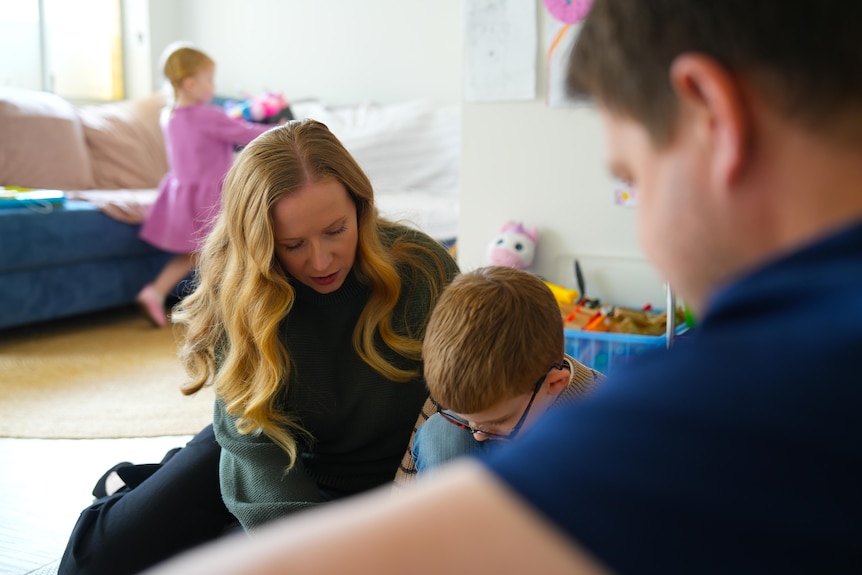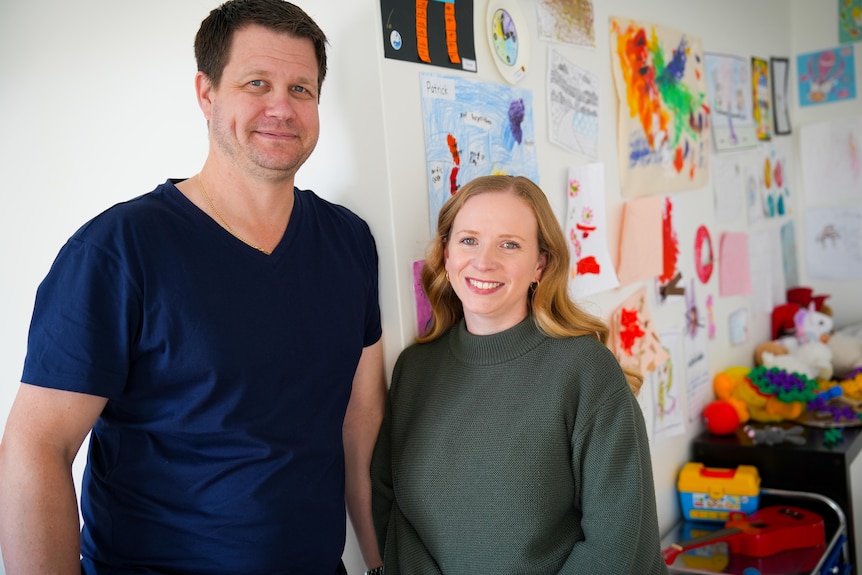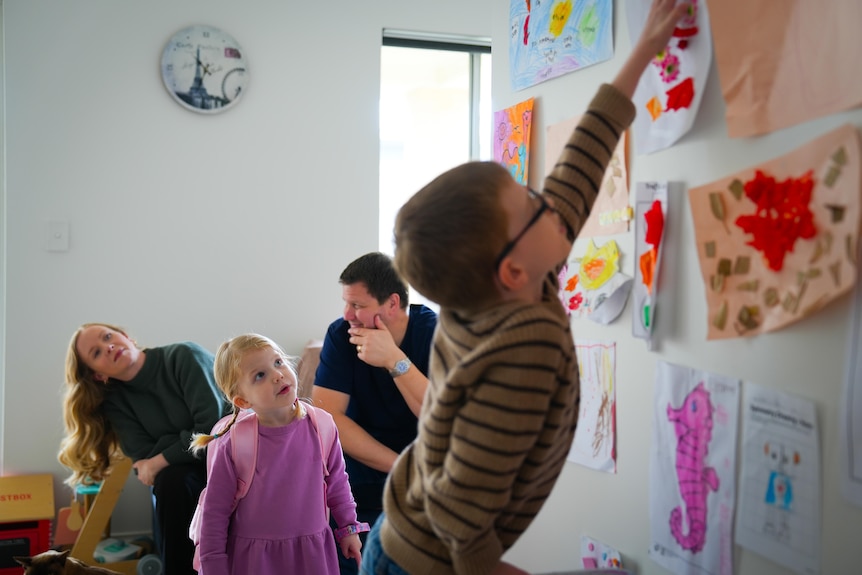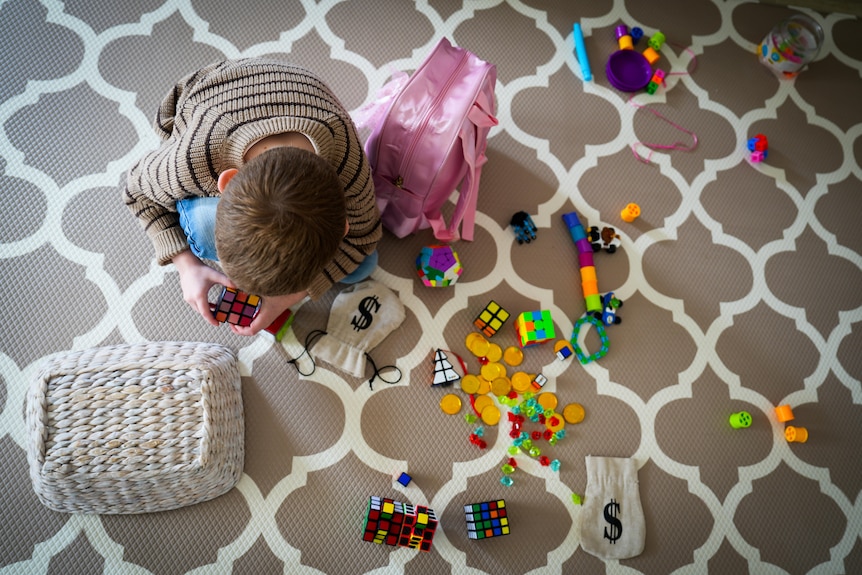When Andrew Leech trained as a GP 11 years ago, he thought the main problems he would see in children would be coughs and colds.
He wasn’t anticipating a wave of children so anxious they couldn’t go to school or small children struggling to work. He didn’t expect to see so many teenagers struggling with depression or young people with their whole lives ahead of them thinking about ending it all early.
“I would say in an average week I would see at least one or two teenagers with very strong suicidal thoughts,” he said.
“I have had cases of [children] down to eight, seven with suicidal thoughts or write a plan and present it to me in here.”
A growing number of Australian children and teenagers are taking antidepressants, according to data released by the ABC. Prescriptions for SSRIs, the most common type of antidepressant, increased by 247 percent in the last 10 years.
Dr Leech is not surprised by these figures. He sees the demand for mental health care every day and has himself prescribed SSRIs to many young people.
And while doctors say the rise in antidepressant use likely reflects growing numbers of people seeking help, rather than overprescribing, some parents say they feel judged if they “medicate” their children.
Healing a child with ‘paranoia that things will hurt’
Among the children prescribed medication to manage their mental health is seven-year-old Patrick from Perth.
His parents, Kristen and Warren, suspected from an early age that he had a neurological condition, and when they took him to a pediatrician at the age of six, he was diagnosed with ADHD and prescribed stimulant medication.

Kristen and Warren say that treating Patrick’s ADHD and anxiety has allowed his personality to shine. (ABC News: Aran Hart)
Once they had prepared the right medicine for him, the effect was great: He was able to focus on tasks and control his emotions better.
“I still remember the first day we gave him medicine,” Kristen describes.
“He took a shower and said to me, ‘Mommy, it’s like the rain came and took the bad cells away.'” That’s what he said, and he was six.
One side effect of managing ADHD was that it revealed underlying anxiety that wasn’t as obvious before.
Patrick had a hard time leaving the house because he was afraid of flying insects. As he toured malls and swimming pools, he looked up at the ceiling and wondered if it was going to fall.
“It was almost like a paranoia and a fear that things would hurt him,” Kristen said.

Kristen and Warren say medication has allowed Patrick to engage in psychological support. (ABC News: Aran Hart)
Kristen and Warren tried standard methods for dealing with anxiety in young people, such as “exposure therapy” – where you gradually expose someone to what they fear – and psychological support. It didn’t work.
It was only after trying SSRIs, at the suggestion of a GP, that they saw a difference.
“He’ll still say to me, ‘Oh, I saw something fly!’, or he might still say, ‘Oh, is the air safe?’ him,” Kristen said.
“Now we can say, ‘The bees won’t come to you, they want the pollen,’ or ‘This building is safe, we wouldn’t be allowed to be here if it wasn’t safe.’
“Before, if we tried to reason with him, there was just a complete block there. He just couldn’t. It didn’t matter, because these feelings were so intense.”
Patrick’s parents even caught him chasing a dragon recently – something that was once unthinkable.
“Reducing stigma” means more people getting help
The theories behind the rise in mental distress among young people are varied. Experts have pointed to inequality, climate change and global instability as damaging to young people’s mental health. The rise of smartphones and social media have also been called out, as have the lasting effects of the COVID-19 lockdown.
As Dr Leech sees it, it is also a reflection of the increasing pressures families and children are under.
“There’s a lot of pressure on families at the moment,” he said. “From the cost of living, the way it’s under pressure from school maybe – a child’s daily tasks, the homework, the extracurricular activities – the busy lifestyles that people are leading, which makes two full-time parents often work, it’s a lot of stress.”
Many doctors say that we do not know definitively what causes this. All we have are well-informed theories and a growing number of young people who need help.
There is also more awareness of mental health conditions today than there was 10 years ago – and that alone means more people are seeking treatment.
“We have a lot of data from surveys that show that in fact we are not meeting the needs of children and young people, that there is a high rate of psychological distress out there,” says Elizabeth Moore, president of Royal Royal. Australian and New Zealand College of Psychiatrists.
“So what I would say is that people coming forward for help is actually very good… we’ve worked hard to reduce the stigma, so people feel like they can come forward.
Loading…
Philip Hazell, a 36-year-old psychiatrist who has written a guide to prescribing antidepressants for young people, says it’s not just prescription rates that have increased – it’s all about mental health treatment.
“To give you an analogy, we know that the number of children hospitalized for mental illness has increased dramatically from the early 2000s to today,” he said.
“There is certainly very compelling evidence that more young people are reporting stress now than, say, a decade or two ago. But if you look at it objectively [underlying] rates of mental disorders, mental illness and the population, it hasn’t changed much.”
‘He’ll grow out of it’: Parents face unsolicited advice
To Warren and Kristen, there was nothing external that caused Patrick’s anxiety: it’s simply part of who he is.
But despite increasing awareness of mental health, they have been condemned for ‘medicating’ Patrick.
“We actually got it from extended family,” Warren explained. “Also from my parents, [comments like] “Oh just give him a different diet and he’ll be fine.”
“And we still get it now,” added Kristen. “Like, ‘Why are you giving him medicine? This is cruel. He will grow out of this.”

Kristen and Warren say they were judged and even called “cruel” for giving Patrick medication. (ABC News: Aran Hart)
There are other strategies that patients are encouraged to try before SSRIs, such as lifestyle changes and seeing a psychologist. Even a tool called psychoeducation, which involves helping a mental health patient understand their condition, can help reduce anxiety levels.
But when these methods don’t work, or when a child is so anxious they can’t even begin to engage in them, SSRIs can help, says Harriet Hiscock, a pediatrician and researcher with 18 years’ experience, based at the Murdoch Children’s Research Institute.
“If they [antidepressants] work and they help the child, it can be life-changing,” said Professor Hiscock.
“They can calm down. They can get the courage to get out of bed and go to school. They can start enjoying being with their friends again. They can be less irritable and aggressive at home, with their parents.
“They will also start to be able to use these cognitive behavioral strategies, because they would have been in a situation where their anxiety was so high that they … couldn’t do any of it.”
Some doctors, including Dr Leech, say accessing this other support can be more difficult – and more expensive – than seeing a GP and getting a script. Many psychologists, occupational therapists and specialists have long waiting lists and can cost hundreds of dollars, he said.
Antidepressants are “well researched” but come with side effects
There are risks associated with taking SSRIs, as with all medications. Weight gain is common. There is also, paradoxically, an increased risk of suicide when you first start taking them.
The longer they are taken, the harder it can be to stop taking them as well.
Katharine Wallis, a GP and University of Queensland professor who studies antidepressant withdrawal, says these issues should be weighed carefully before prescribing.
She also believes there is only so much medicine can do.
“I think it’s important to have a social connection. It’s important to have social skills, and not hide in your bedroom on your own, online,” she said.
“I think the idea of keeping antidepressant prescriptions at the sharp end of the spectrum — so people who are very seriously ill — is important, and that we don’t see that trickle down to milder to moderate.” spectrum.”
Loading…
Research shows that SSRIs are most effective when combined with psychotherapy and not taken alone.
Some doctors said they would like to see more research on the long-term effects of antidepressants in children. In response, other doctors said that antidepressants were among the most studied drugs prescribed to children.
“The treatments we use for mental health are very well researched. The thing is, they’re not as well researched in children as they are in adults,” Professor Hazell said.
Dating too short for ‘Pandora’s box’ of mental health issues
At the same time, GPs say they are seeing a growing number of young patients coming through the door looking for help with their mental health.
Often overlooked in discussions of the youth mental health crisis is the impact on those on the front lines: doctors.
When you talk to Dr Leech, you can see in his face how much he cares about his young patients, and how seeing so many of them struggle weighs on him too.

Kristen and Warren say Patrick has gained confidence after treating ADHD and anxiety. (ABC News: Aran Hart)
Cathy Andronis, Chair of Psychiatry at the Professional Association of General Practitioners, RACGP, also described the heavy burden on doctors.
“The reality is that GPs are still managing it,” she said.
“I just think that the family doctors often feel as hopeless or helpless to help some of these young people with their problems as the young people themselves. It’s a systemic issue. It’s a whole societal issue.”
Dr Andronis wants to see the GP system changed to accommodate longer appointments for people with mental health problems, so doctors don’t feel rushed if a patient comes in with a problem.
“People are loathe to open Pandora’s box in a short period of time,” she said.
Dr Moore, from the peak body for psychiatry, wants the Federal Government to fund more training posts for psychiatrists to strengthen the mental health workforce.
What helps Dr Leech stay positive are the days when he can make a difference. When he sees a child who comes in with no hope and ends up rejoining the world.
“I’ve had an incredible turnaround in children, maybe as young as eight, nine years old, with serious issues around anxiety, in particular, but also school bullying and social issues,” he said.
“I explain.” [young patients considering SSRIs]’These tablets are not going to be a magic wand and then you wake up feeling amazing and life is perfect.’
“It’s a small step and we don’t want to numb children and we don’t want to numb teenagers.” We want them to have feelings, because that’s life.
“Sometimes it doesn’t work and we just have to go back to the drawing board.”

Doctors say SSRIs can be used to treat anxiety disorders and social phobia in children, along with psychological support. (ABC News: Aran Hart)
Loading
#cruel #hell #grow #Parents #decisions #medicate #children #met #judgement